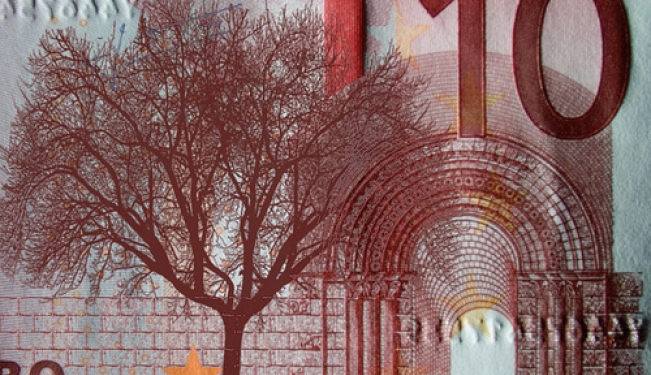Analysis on the three different scenarios that could result in Europe within a year, as the European Union tries to bring itself out of the economic crisis.
For such a small country, Greece has created a lot of trouble for Europe. The process of trying to prevent the country from defaulting on its debt has cost not only enormous sums of money, but has thrown the whole existence of the EU into question. These claims, while overly dramatic, have an element of truth to them.
Regardless of what happens, the EU as it we know it today will not survive the next year. The pressures to change are too strong. It will transform into one of three different entities. The first is a hard currency Europe. The second is a soft currency Europe. The third is that the euro zone will survive, but with a smaller number of participating countries clustered around Germany. This too will change the way Europe sees itself, governs itself, and deals with the outside world.
Three Possible Paths
The first of these paths, charted by Germany, France, and their close allies in Europe, is already in the making, and if successful will ensure that creditor countries get what they want. This is an economic constitution for Europe that prevents EU member states from borrowing too much for too long, and puts them under direct political administration from Brussels if they do not succeed on their own. This economic constitution would not be a political constitution, however. It would be a one-sided affair in which national sovereignty and democracy would only be extinguished or constrained for those countries running afoul of the rules. Creditor countries would have nothing to fear.
The second of these paths, preferred by the US Government, George Soros, and some key European policy entrepreneurs, has been developed in principle but has not been adopted by European institutions as their first-choice policy. It involves the issuing of euro zone bonds as leveraged finance to use in shoring up the finances of countries and banks that are proving short of capital. If successful, it will ensure that financial institutions, most of them in the core creditor countries, get what they want, which is a maximum return on their current investment in Greek debt. It would also ensure that debtor countries get the fiscal room they need to spread out repayments over a longer period, and that ordinary citizens have better economic and job prospects through quantitative easing. As many have noted, this second path requires a political agreement in order to work—over who will be responsible for repaying the bonds—that is absent.
The third of these paths, currently preferred by none of the EU's member state governments but an increasing number of citizens, became a much more viable option when the possibility was raised of a Greek referendum on the euro zone rescue package. It involves leaving the euro voluntarily or being driven out for refusing to comply with the demands made by the creditor countries. The choice is between a package of tax increases and budget cuts which forces the debtor country to pay its way out of the current crisis, or a drop in the value of the national currency once it is re-introduced, which imposes the cost of adjustment on investors. If this were to happen and the precedent were set, Portugal would very likely follow Greece.
Note that none of these options incorporate either a political union or fiscal transfers between the member states. Neither of these appears to be a realistic option, despite the fact that they both are necessary to make a currency union run properly during a crisis. We can see that neither option is viable due to the unwillingness of creditor governments to speak about fiscal transfers, and the failure of the Constitutional Treaty in 2004. That Treaty was rejected by voters in several countries because it adopted the symbolism of a political union. For reasons outlined below, this is not about to change. Why are these the only options, and what are the consequences of each path?
Choosing Between the Paths
One way of viewing Europe's failure to consider a political union that supports the monetary union is the member state governments’ attachment to sovereignty. Despite the achievements of the EU, it is still built on the principle that the member states remain ultimately sovereign. The treaties are riddled with escape clauses, EU legislation is constructed to preserve member state autonomy at the implementation stage so that it builds on national laws, and the Heads of Government in the European Council still dominate key decision making. As we have seen in the Cannes Summit, patterns typical of international politics outside the EU repeat themselves within it—by the dominance of power (shared by France and Germany) over procedure.
Another way of viewing this reluctance to take Europe to the next level is the different societal attitudes towards what proper public policy should be, coupled with assessments that are made or labels that are slapped on other countries. What does it mean to be a state in the EU? Does it mean responsible finance or fiscal stimulus in the interest of public welfare? Does it encompass a sense of mutual responsibility and common identity that makes compromise more likely and common EU political institutions more possible, or does it divide national societies into “us/them” camps in which EU institutions, if developed at all, will focus on conflict and domination of those that are on the losing side?
We can see in the euro zone crisis that the latter has been the dominant pattern. It was there at the start of monetary union in the 1990s, but was repressed soon after the initial list of participating countries was chosen. Those sentiments and recriminations never went away, but waited for their day of reckoning, which is now.
A third way of viewing Europe's situation combines these two factors into economic nationalism and a new kind of conflicted politics within the EU. The political scene is highly polarized between creditor and debtor states, favoring a hard versus a weak currency, with strong versus weak controls on fiscal policy (budget deficits), and on macroeconomic policy (inflation and interest rates) more generally. We can see this in the polarized nature of the demands being made on Portugal and Greece, but also on the creditor countries through the threat of holding a Greek referendum. The latter is due to take place no sooner than a month away, and after the EU must decide to release further funds to Greece or demand that Greece leave the euro zone. And indeed, France and Germany put that ultimatum to Greece on November 2nd. The EU has become ungovernable in important ways as the member states play hardball over the future of the Union.
This fight over the future of Europe has volcanic energy behind it. There is rage so strong that it is willing to smash highly-prized principles of democracy, international relations, and what the EU has been all about until this point. Germany, the Netherlands, and Finland in particular have lost patience with countries that they depict as “deficit sinners,” to the point where they push for the economic and political stewardship of Greece and countries that are similar to it. The Troika—the threesome of the EU, the European Central Bank, and the IMF that must approve all economic policies in Greece if the country is to receive its lifeline of financial support—has political control over not only budget policy, but a whole host of employment, wage, public ownership, and tax policies. Greece and others would be identified and treated as failed states whose sovereignty will be terminated for their own good and the greater European good.
That is the reason their plans might be called an economic constitution. If it is established, it will be one-sided and it will lead to a hard currency euro zone, but at the cost of economic growth and of democracy in those euro zone member states that cannot live with the membership rules. This constraint on democracy is particularly problematic since the euro itself is so one-sided. The ECB is obligated to pursue price stability only, not to balance it against growth, as is the case in the United States. If this cannot be accomplished, then the second-best choice would be the smaller euro zone.
Greece, Portugal, and perhaps Italy want to avoid economic and social policy change that the new economic constitution implies. In Greece, the public may very well reject it. Voters want the euro, but not the costs and not the political colonization of the EU and IMF that the Troika embodies. Although a weak currency euro zone would suit them best, it is now clear that Greek voters might be willing to leave at a point in the future if further compromises are not made. Again, a smaller euro zone becomes the second-best choice.
This tremendous energy of colliding demands and rage at the other side is what is driving the current process. It also takes place in an environment where financial markets make it impossible to ignore any longer, and where the prospect of default on Greece's debt (and that of other countries) makes action a matter of survival. Either Greece is made to pay its creditors in part, or the creditor countries must focus on channelling their limited funds into salvaging their own banking sectors.
This is why the EU is at the point of no return, and why the EU as we know it will not survive the next year.
Which Path is Most Likely?
The dissent in how to proceed from the current point would usually create three possible options in a crisis. The sparks released by the current crisis have created a fourth one as well. Those options are collusion, coexistence, collision and colonization.
The first three options are compatible with the continued sovereignty of the EU member states. Collusion occurs when all member states reach an agreement about the future course of policy. We can set this aside for obvious reasons. Coexistence incorporates a compromise of two views that are difficult to combine, which is what existed in the EU leading up to the crisis. Many of the elements of the economic constitution that the creditor states now want imposed existed before, but were compromised by loopholes allowing for political flexibility, which in turn were made even bigger in 2005. That coexistence of visions is how Europe got into this position in the first place. Part of the anger of creditor states is at this negotiated coexistence of hard institutions and political finesse. That is to end if they get their way.
That leaves us with two further options: collision and colonization. It is here that the choices of the member states and of the voters who support and punish them will be decisive, and where the primal instincts of what is most important will come forth. Given that the policy preferences are known to be opposed, the defining issue is whether Greece and countries like it will separate from the euro zone or whether they will submit to the demands that will be imposed on them if they stay.
The first of these choices at the least recognizes that democracy and the euro are incompatible for some countries, and selects the path of freedom. The result will be a smaller euro zone, not the death of it. Once the euro zone countries are over the shock of Greece defaulting on its debt, they will look back on this episode with a sigh of relief that the conflict was terminated before it could do even greater damage. It could still be much worse.
The second of these choices selects responsibility over freedom, and places faith that the pain will reap rewards, and that not only the Greek finances will be transformed, but the hearts and minds of Greek voters as well. However, precisely because creditor states have little faith in them doing this voluntarily, they will be forced to be colonized.
The choice that European leaders and voters face is therefore between these two paths. The path of responsibility will lead to a hard currency euro, one that dampens economic and job growth in the euro zone for at least a decade and probably more as shock therapy ensues to turn public finances around. It will do this at the cost of colonising the EU's weaker member states. The EU's growth will primarily take place in the EU's new member states in Central and Eastern Europe, for as long as these countries can resist the pressure from Brussels to join the euro at the first opportunity.
The path of freedom and democracy, which looked more likely in the context of a possible Greek referendum before that option was retracted on November 4th, would be more painful and costly for all involved in the short term, but beneficial later. It will result in three currency areas within Europe: the hard currencies, mostly within the euro zone and characterized by (mostly) slow growth, the ex-euro zone countries and the Balkans, characterized by slow growth and weak currencies, and the strong-growth countries of Central and Eastern Europe, who possess higher rates of inflation, interest rates and economic growth.
What are the implications?
If the path of freedom and democracy is taken, it will have two key advantages once the crisis is over. It will allow for the greatest degree of economic growth and development across the single market, with rising employment. A smaller euro zone would also make it easier for the remaining member states to launch euro bonds more successfully to help themselves and their banks. Without countries like Greece draining a euro bond fund, it would be clearer to the remaining members and possible investors like China, India, Brazil, and the US that investing in the euro zone worthwhile. In short, this path is ultimately also the path of greater welfare.
The choices will affect not only European economic prospects, but global ones as well. The path that Europe takes will decide whether the on-going economic difficulties of the current economic depression resemble the patterns of the 1930s or the 1870s. The depression that started in the 1870s went on for nearly 30 years, interspersed with hopeful bubbles that ended up exploding. The extremely tight money supply and rigidity of exchange rates, policies taken under a “path of responsibility,” only prolonged the depression. If the creditor countries succeed in getting their way today, deflationary economic policies will dominate for some time, with welfare costs both in Europe and abroad.
The depression of the 1930s was the first to be ended through massive government borrowing and spending, precisely because democracy placed new demands on public policy. While it looks unlikely that a large euro bond project will get off the ground, a smaller euro zone allows individual countries that leave it to do more in this direction.
Choosing the path in which Greece and the euro zone go their separate ways will also bury the illusion that all EU member states can and should join the euro, regardless of their domestic economies and polities. It is that illusion that was most irresponsible in the past. The death of that illusion will not be the end of Europe. It will be the rebirth of realism in EU politics. The euro zone will enlarge again when circumstances permit, but only with an eye on the facts.
For more than 10 years, Fair Observer has been free, fair and independent. No billionaire owns us, no advertisers control us. We are a reader-supported nonprofit. Unlike many other publications, we keep our content free for readers regardless of where they live or whether they can afford to pay. We have no paywalls and no ads.
In the post-truth era of fake news, echo chambers and filter bubbles, we publish a plurality of perspectives from around the world. Anyone can publish with us, but everyone goes through a rigorous editorial process. So, you get fact-checked, well-reasoned content instead of noise.
We publish 2,500+ voices from 90+ countries. We also conduct education and training programs
on subjects ranging from digital media and journalism to writing and critical thinking. This
doesn’t come cheap. Servers, editors, trainers and web developers cost
money.
Please consider supporting us on a regular basis as a recurring donor or a
sustaining member.
Support Fair Observer
We rely on your support for our independence, diversity and quality.
Will you support FO’s journalism?
We rely on your support for our independence, diversity and quality.






